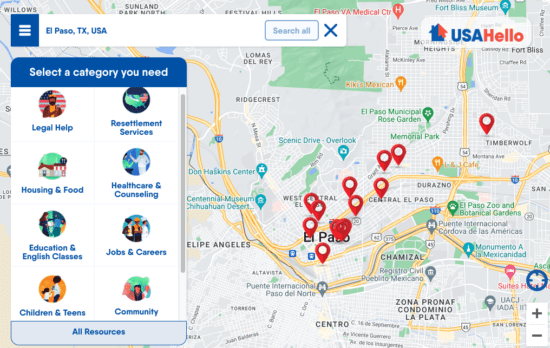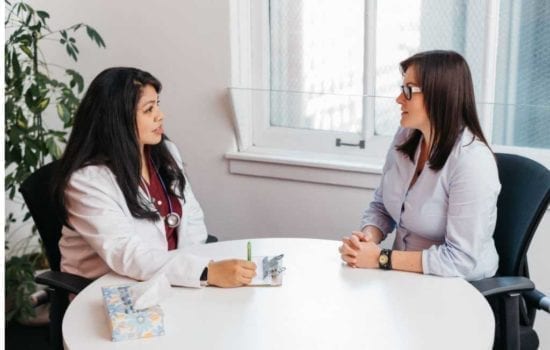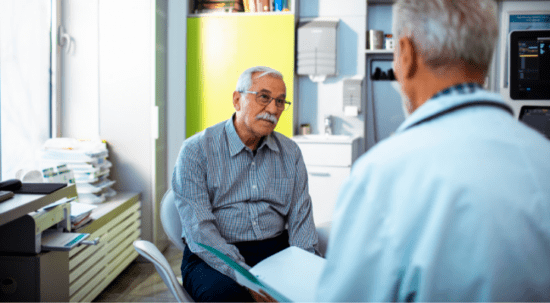What is mental health?
Mental health is about your feelings, how you think, and how you act. It is an important part of your overall health. It can even affect your physical health. Good mental health helps you deal with daily life, make good choices, and handle stress.
Many things can affect your mental health. As an immigrant, you might face different challenges that can affect how you feel. Adjusting to life in the USA can feel overwhelming or lonely. Leaving behind violence or being away from family and your cultural community can also impact how you feel.
When to consider getting help
Mental health is just as important as your physical health. Getting treatment can help you feel better and improve the quality of your life.
It may be time to seek support if:
- You often feel sad or anxious
- You are unable to cope with daily tasks
- You experience changes in sleeping or eating patterns
There is help out there for you. It can be hard for some people to talk about their feelings, especially if it is not something you did in your home country. It is okay to need help and not something to be ashamed of.
Types of treatment
The two most common types of mental health treatment are:
- Therapy includes psychotherapy or ‘talk therapy’ but there are many different types. You can speak to a therapist by yourself or in a group.
- Medication is often prescribed in combination with therapy. Medication can help manage symptoms of mental health disorders.
Who can offer treatment?
Different professionals are trained to treat mental illnesses in the United States:
- Primary care providers are licensed to treat general health problems and can prescribe medication.
- Psychiatrists are medical doctors licensed to check for mental health problems, provide therapy, and prescribe medications.
- Psychologists are professionals licensed to test mental health problems and give therapy. Psychologists cannot prescribe medications.
- Social workers are licensed to assess and treat mental health problems.
- Counselors and therapists are licensed to provide therapy.
- Peer specialists are professionals who have experienced mental health conditions and are trained to offer emotional support.
Mental health professionals may work with specific groups, such as refugees or children. They may also be trained in specific areas and may focus on depression, addiction, or trauma. Many offer services that are culturally sensitive and some can provide support in languages other than English.
| Your immigration status does not affect your ability to receive mental health services. You are not required to report your immigration status to healthcare providers. |
How to find mental health services
It can take time to find the right mental health help but you have options. You can find help through your:
- Primary care doctor. They can check your mental health and refer you to specialists. Your health insurance may cover help.
- Friends and family. They might know good resources or professionals.
- Local resettlement agencies if you get ORR benefits as a refugee, asylee, or other eligible immigrant. They offer special support for immigrants.
- Community and religious organizations. These places often have mental health resources.
- School or college. They often provide student mental health services.
- Workplace programs. Check if your employer offers an Employee Assistance Program (EAP).
- Public library. Use them for information and local service recommendations.
You can also search for services and providers online:
Website |
Offers |
|---|---|
List of mental health resources by zip code or city |
|
List of centers providing general health and mental health services |
|
Helps undocumented youth find mental health support |
|
List of culturally responsive counseling services |
|
List of mental health and other resources for LGBTQ+ immigrants |
|
Resources for Muslim Americans |
|
List of clinics that offer free or low-cost health services |
|
List of services for Asian Americans, Native Hawaiians, and Pacific Islanders |
|
List of therapists by zip code |
|
List of clinics that treat mental health problems or substance abuse |
|
List of facilities that treat substance abuse and addiction |
|
List of counseling services for the South Asian community in the U.S. |
|
List of counseling services for the Latinx community in the U.S. |
|
List of free or low-cost services for undocumented immigrants |
|
Mental health services and support for survivors of war and torture in Arizona, Georgia, and Minnesota |
|
List of mental health services in Illinois for immigrant communities |

Immediate help
It may take some time for you to get an appointment with a mental health provider. Here are ways to find support and care for yourself in the meantime.
- Reach out for support. Talk to your family or friends or someone you trust who can listen to you and offer support.
- Practice deep breathing exercises. Take slow, deep breaths to help calm yourself down. Try the 4-7-8 method. Breathe in for 4 seconds, hold your breath for 7 seconds, and exhale for 8 seconds.
- Do an activity you enjoy. Do something that will make you feel better, such as going for a walk, journaling, or listening to music.
- Be healthy. Eat balanced meals, stay hydrated, avoid alcohol, and aim for 7-9 hours of sleep each night to support your mood and energy levels.
- Call or text a crisis hotline.
- Join a support group.
Crisis hotlines
Crisis hotlines offer free support for people experiencing an emotional crisis. They keep your information confidential and do not share it with anyone. They are usually available at all hours of the day and every day of the week. All of these hotlines are staffed by counselors trained to listen and provide help. Some offer support in multiple languages.
Contact | Number |
|---|---|
988 (call or text) | |
741741 (text) | |
800-985-5990 (call or text) | |
800-422-4453 (call or text) | |
800-799-7233 88788 (text START) | |
888-373-7888 (call) 233733 (text) | |
800-786-2929 (call or text) | |
800-656-4673 (call) | |
800-852-8336 (call) 839863 (text) | |
Trevor Project for LGBTQ+ youth | 866-488-7386 (call) 678678 (text) |
988 (call and press 1) 838255 (text) |
Most of these lines also have an option to chat online. Visit their website to check. If you are texting any of these lines, texting “hello” should connect you to someone.
Call 911 if you are in immediate danger. Tell the operator you are having a mental health emergency. Learn more about how to call the police.
Peer support groups
Peer support groups are with people who have had similar experiences. In these groups, people get the chance to share their experiences and get support from people in their community.
- Immigrants Rising Wellness Support Groups are for undocumented groups, including Black, LGBTQ+, and Latinx individuals.
- NAMI Connection Support Groups are free and for anyone with a mental health condition.
- NAMI Family Support Groups are free and for family members who have loved ones with mental health conditions.
The information on this page comes from mentalhealth.gov, NAMI, SAMHSA, and other trusted sources. We aim to offer easy to understand information that is updated regularly. This information is not legal advice.


